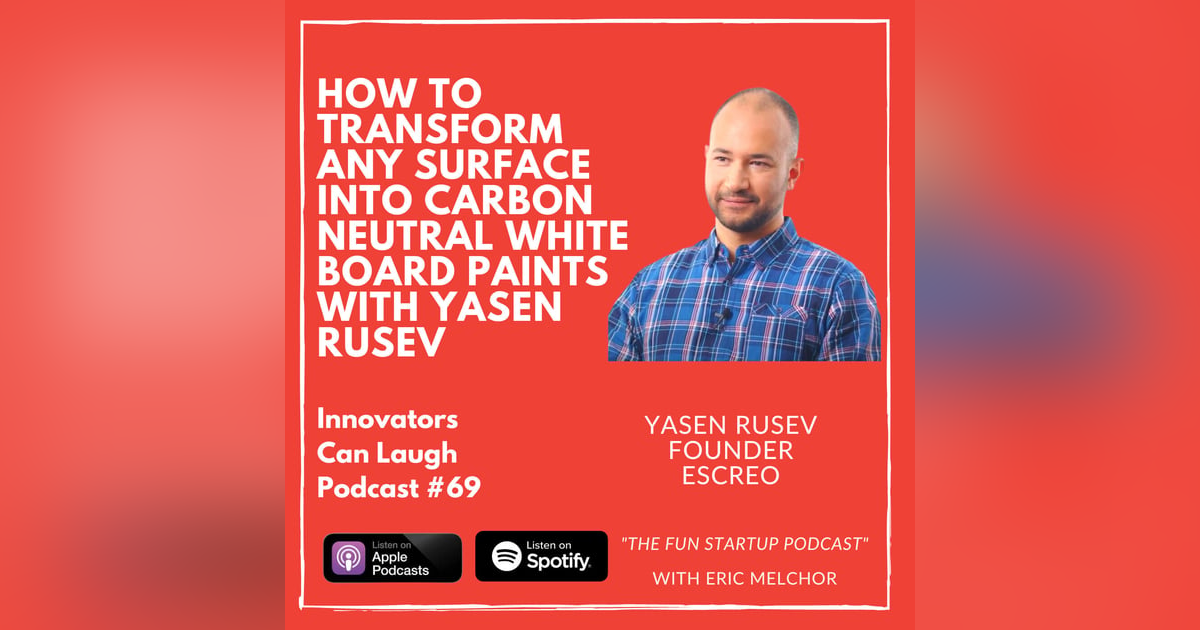How to transform any surface into Carbon neutral white board paints with Yasen Rusev

Imagine you’re working as a driver in Bulgaria and one of your clients is an international business owner. After four days of chauffeuring him around, he invites you to lunch. After two hours of dialogue, he invites you to come to Vienna for a year and learn their business. So, you could come back to Bulgaria and open and manage their business in Bulgaria.
Sounds like a fairy tale right?
Well, it’s not. At least not for Yasen Rusev, co-founder of Escreo. In this conversation, Yasen takes us through his remarkable journey of entrepreneurship, from working as a driver, to participating in accelerators in Silicon Valley, to co-founding a dynamic company that can transform any surface in the world into Carbon neutral white board paints.
Join us in this conversation with Yasen who takes us through his journey and aspirations of trying to make the world a better place.
Do you wish to connect with our special guest?
Visit Yasen’s website: escreo.com
Tune in to every conversation about exciting European Startups and Innovators on Apple Podcasts, Spotify, and Amazon! Leave a rating and review so we can keep making amazing interviews!
Listening on a desktop & can’t see the links? Just search for Innovators Can Laugh in your favorite podcast player.
Connect with Eric:
Visit his website: https://innovatorscanlaugh.com
For the Innovators Can Laugh newsletter in your inbox every week, subscribe at https://innovatorscanlaugh.substack.com
Past Guests:
----
Past guests on Innovators Can Laugh include Yannik Veys, Ovi Negrean, Arnaud Belinga, Csaba Zajdó, Dagobert Renouf, Andrei Zinkevich, Viktorija Cijunskyte, Lukas Kaminskis, Pija Indriunaite, Monika Paule, PhD, Vytautas Zabulis, Leon van der Laan, Ieva Vaitkevičiūtė.
-----
Additional episodes you might enjoy:
#55 Yannik Veys - From creating the Uber for service professionals to growing Hypefury
#53 Tzvete Doncheva - Overcoming barriers to get into a VC with Tzvete Doncheva
#50 Vidmantas Šiugždinis - Personalized Approach to Employee Benefits with MELP
#49 Markus and Daniel - The Digital Memory Album for You and Your Family
#48 Arvid Kahl - Bootstrap Startup Lessons
#45 Dagobert Renouf - Brand design for your Startup in 5 minutes
#42 Csaba Zajdó - Top Startup in Europe for E-commerce: OptiMonk
Tune in to every conversation about exciting European Startups and Innovators on Apple Podcasts, Spotify, and Amazon! Leave a rating and review so we can keep making amazing interviews!
Listening on a desktop & can’t see the links? Just search for Innovators Can Laugh in your favorite podcast player.
Connect with Eric:
Visit his website: https://innovatorscanlaugh.com
For the Innovators Can Laugh newslett...











